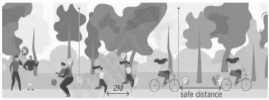16. Every week, Liu Fang, a 38-year-old media worker in Beijing, goes to a store which sells near-expired (将要过期的) food in Sanlitun and returns with a bag of snacks or drinks.
"The price tags on these goods have caught my eye. They are often sold at 10% to 30% of the market price," Liu said. "More importantly, most of them are from big brands (品牌). Why wouldn't I love them?"
Liu is among the increasing number of Chinese people who enjoy buying near-expired food at much cheaper prices. According to the latest report by iiMedia Research, the near-expired food industry had a market size of over 30 billion yuan in 2020. 47. 8% of the consumers (消费者) are aged between 26 and 35.
Unlike the traditional thinking that buying such goods makes them feel shy, more and more young people consider it as a kind of sustainable consumption (可持续消费)that can help reduce food waste.
"I don't care much about the date as long as I can eat it before its expiry. It meets my needs while saving resources and protecting the environment, which is a good thing," Wu Lin, a 19-year-old college student and a fan of near-expired food, told Xinhua.
Actually, food waste is a great challenge for China and other countries. According to a 2020 report from the National People's Congress, about 18 billion kilograms of food is wasted every year in China's urban catering industry (城镇餐饮业).
"As more Chinese people choose to buy near﹣expired food, the food waste will be reduced,"said Liu.
According to CGTN, China had the tradition of saving food leading to the 1990s.
As people's lives improved greatly, many began to make or order more food than could be consumed, CGTN reported. But the trend (趋势)of buying near﹣expired food may suggest that the Chinese virtue (美德) of frugality (节约) is coming back.
"I've been very frugal all my life. Living through a serious famine (饥荒), I'm used to saving every grain and every penny," a woman born in the 1950s, told CGTN. "I'm happy to see more young people joining our group.'












